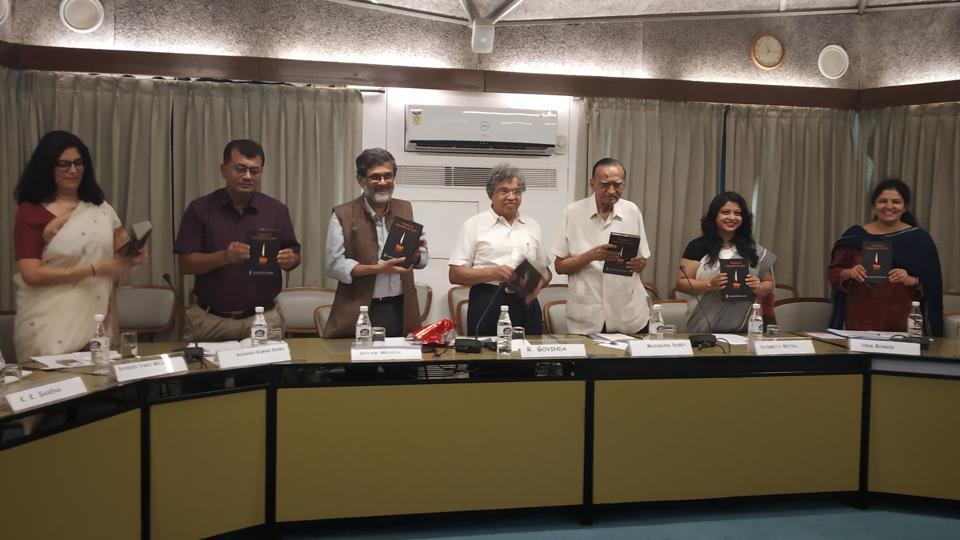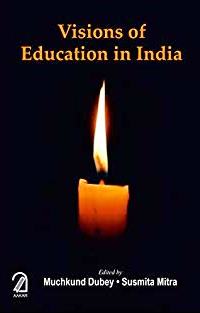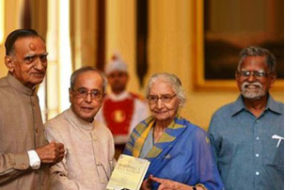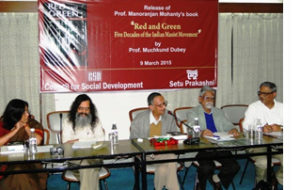 The Council launched the book Visions of Education in India edited by Prof. Muchkund Dubey and Dr. Susmita Mitra at the India International Centre (IIC) on 2nd September 2019. Prof. Shyam Menon, University of Delhi and former Vice Chancellor of Ambedkar University, Delhi was the Chief Guest of the event. Other panelists were Prof. Avinash Kumar Singh, Head, Department of Education Policy, National University of Educational Planning and Administration (NUEPA), Ms. ShireenVakil Miller, Head of Policy & Advocacy at Tata Trusts, and Dr. Hem Borker, Assistant Professor, Centre for Study of Social Exclusion and Inclusive Policy, Jamia Millia Islamia. The panel discussion was chaired by Professor R Govinda, Distinguished Professor of CSD and former Vice Chancellor of NUEPA.
The Council launched the book Visions of Education in India edited by Prof. Muchkund Dubey and Dr. Susmita Mitra at the India International Centre (IIC) on 2nd September 2019. Prof. Shyam Menon, University of Delhi and former Vice Chancellor of Ambedkar University, Delhi was the Chief Guest of the event. Other panelists were Prof. Avinash Kumar Singh, Head, Department of Education Policy, National University of Educational Planning and Administration (NUEPA), Ms. ShireenVakil Miller, Head of Policy & Advocacy at Tata Trusts, and Dr. Hem Borker, Assistant Professor, Centre for Study of Social Exclusion and Inclusive Policy, Jamia Millia Islamia. The panel discussion was chaired by Professor R Govinda, Distinguished Professor of CSD and former Vice Chancellor of NUEPA.
The Chief Guest Prof. Shyam Menon mentioned in his speech, “The book takes a broad and comprehensive view of the Indian education scenario, thankfully not from the restricted angle of centrally sponsored schemes and administrative actions. The book contains interesting chapters by way of analysis of visions on education, historical analysis of educational documents and policies, people’s movements and critical analyses of policy from the rights perspective. I have no doubt in my mind that this book is going to be an important reference for scholars and practitioners of education and public policy.
The major thrust of Kothari Commission was its recommendation of the common school system with a network of neighborhood schools, which sought to ensure that children of all backgrounds in every neighborhood went to the same school. This essentially came out of the idealism that education is potentially a leveler and a force that would effectively undermine the inequalities in society. This idealism however found no takers among the elite and the upwardly mobile middleclass who dominated the bureaucracy and the professions, and who controlled the implementation of the policy. In spite of its mention in the NPE 1968, there was hardly ever any serious attempt at building a common school system. The education system is much more differentiated and stratified today than it was in the 1960s.
The shift towards greater uniformity across the county that was seen in the NPE 1968, and subsequently the move in 1976 through the 42nd Constitutional Amendment to give the union government greater say in matters like education, found much resonance with an emerging new middle class whose aspirations were towards constituting a new national elite. Private English medium schools, mostly affiliated to the CBSE, began to mushroom not merely in metropolises and state capitals, but also in the second and third tier towns. This started in the seventies and the trend continued through the eighties and beyond. I would consider that CBSE, like Maruti 800, became the mascot of the emerging Indian middle class.
No matter what the stated policy intent may be, what will eventually get implemented will essentially be according to the deeper power dynamics that characterize our society and our times. That is the reason why I, for one, would not take National Policies on Education too seriously. They have an intrinsic political significance, and almost nothing else.
The third of the four pillars of learning, Learning to Live Together and With Others, needs to be studied at some depth as to where it comes from and what its journey has been. The Delors Commission Report came out at a time when the project of globalization was on its upswing. The world has changed a great deal since then and it will be interesting to see how the formulation of this particular pillar of learning has fared in terms of its acceptance by the various member states of the UNESCO and has found reflection in their respective educational systems and processes.
Across the world today, we see a clear trend of political formations and leaders coming to power on the basis of their successful campaigns that are focused essentially on fear-mongering, – fear of immigrants, fear of minorities, fear of people who look, eat, dress, worship and have sexual orientations different from the majority – in short, fear of the “other”. This kind of leadership that derives its power essentially from being divisive, unleashes sporadic expressions of intolerance and hatred in society, often in the form of brutal violence.
The politics of fear and hate have created millions of stateless people. There are about 750,000 Rohingya people in detention camps in the outskirts of Cox’s Bazaar in Bangladesh. The children of these camps are denied opportunities of schooling under the education system of either Myanmar or Bangladesh, both countries being keen not to have to be responsible for them.
UNHCR estimates that there are more than 10 million stateless persons in the world, a number greater than the population of some countries. India may have just added another 2 million to it. I think of children of these communities of stateless persons and wonder what would be the nature of education that we will be giving to them.”
 Published by Aakar Books, Visions of Education in India seeks to review education in the country through a matrix of nation-building, democratization process, identity, power, social and economic divisions, and social hierarchies – all in the overall framework of globalization and neo-liberalism. The book has contributions from 15 domain experts, leading academics and activists (including the editors themselves), Medha Patkar, J.B.G. Tilak, Prabhat Patnaik, G. Hargopal among others. The book traces the journey of visions of education since the ancient times, and emphasizes that in the complex pluralistic society like that of India, it is nearly impossible to choose a single vision of education that satisfies all our needs and aspirations. What is important is to be able to reconcile the differences among the visions to the extent possible and bring the best elements of these visions within a unified policy framework.
Published by Aakar Books, Visions of Education in India seeks to review education in the country through a matrix of nation-building, democratization process, identity, power, social and economic divisions, and social hierarchies – all in the overall framework of globalization and neo-liberalism. The book has contributions from 15 domain experts, leading academics and activists (including the editors themselves), Medha Patkar, J.B.G. Tilak, Prabhat Patnaik, G. Hargopal among others. The book traces the journey of visions of education since the ancient times, and emphasizes that in the complex pluralistic society like that of India, it is nearly impossible to choose a single vision of education that satisfies all our needs and aspirations. What is important is to be able to reconcile the differences among the visions to the extent possible and bring the best elements of these visions within a unified policy framework.
The book launch event was covered by a number of digital media platforms in Hindi and English including hindusthantimes.com, dnaindia.com among others, highlighting on the timely launch of this book when the country is in the process of drafting a new education policy after decades, which demands a deep dive into this sector for a stronger policy framework.




